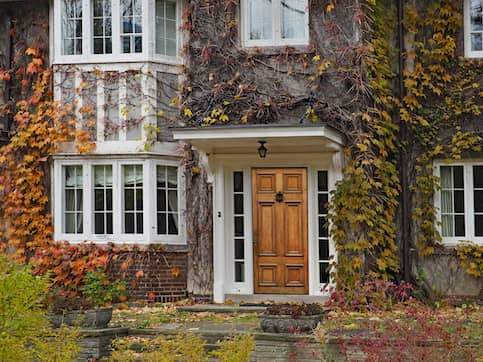Property tax is an assessed fee based on the value of a property. It’s one of many expenses that must be accounted for if you own property or you’re thinking about buying a home.
All homeowners pay property taxes, so it’s critical that new homeowners understand how property taxes work.
Let’s take a closer look at what property taxes are, how to calculate them and how property taxes can ultimately help you decide where to live and how much house you can afford.
Property Tax Definition
An individual or entity pays property tax on an owned property. Property tax – which is an ad valorem tax – is based on the assessed value of what’s known as real property.
In the U.S., states and local municipalities generally levy these taxes to fund school districts, community amenities and other local expenses and projects. Property taxes can vary widely between states and even adjacent municipalities.
Property Taxes Vs. Real Estate Taxes
The terms “property taxes” and “real estate taxes” are synonymous. They both refer to the tax on owned real estate. Real estate tax and property tax are usually used interchangeably but aren’t to be confused with personal property tax – which is a tax on movable assets such as cars, boats and planes, but not on stationary assets such as homes or real estate.
See What You Qualify For
Buy A Home
Discover mortgage options that fit your unique financial needs.

Refinance
Refinance your mortgage to have more money for what matters.
Tap Into Equity
Use your home’s equity and unlock cash to achieve your goals.
How Does Property Tax Work?
Property taxes are calculated using the property’s value and the city’s tax rate. Many factors can affect a property’s value, including the physical home and the land it sits on.
A tax assessor estimates the market value of all the owned property within their jurisdiction. Assessors prepare property tax assessments for property owners to determine how much they will pay in property taxes.
In addition to tax assessors, local officials oversee and set the property tax rate for their municipalities. When local officials determine a local property tax rate, they consider the property type along with the county and state property tax where the property is located.
Because a home’s property value is closely monitored, changes to a property can cause a property tax increase or decrease.
How To Calculate Property Tax
If you’re interested in estimating your property taxes, follow this simple formula:
Assessed Home Value × Tax Rate = Property Tax
Since multiple factors determine each variable of the equation, your property tax amount will only be an estimate and may not mirror how much you actually end up paying in property taxes. However, calculating this estimate can make you better prepared for your tax bill.
The property value in this equation is the assessed value of your home, which you can estimate by looking at comparable properties or using a home assessor’s calculations. Tax rates vary depending on where you live, but they’re usually decided by your county, city or town.
It’s important to note that the property’s assessed value won’t necessarily match its appraised value. And many states have laws limiting assessed value to a percentage of a property’s appraised fair market value.
Calculating Property Tax: An Example
Suppose you’re a resident of Chicago in Cook County, Illinois. Suppose also that your home’s assessed value is the county’s median home value of $265,800, and your property tax rate is the county’s average property tax rate of 1.38%.
Under this scenario, what should you expect to pay in annual property taxes?
Again, here’s the mathematical formula for calculating property tax, keeping in mind that you’ll want to convert the average property tax rate – which is always expressed as a percentage – to decimal form (.0138) when you multiply:
Assessed Home Value × Tax Rate = Property Tax
$265,800 × 1.38% = $3,668.04
So, according to the example, you could expect to pay $3,668.04 in annual property taxes. If you’d like to try the formula, find your city or county’s average tax rate online. Also, many online property tax calculators can find that information for you.
Before you start your house hunt, estimating property taxes for the neighborhoods you’re interested in may help narrow your search, leaving you free to focus on homes that won’t break your heart – or your wallet.
Getting preapproved for a mortgage can show you what you can afford and show home sellers that you’re a serious and confident buyer.
What Is Property Tax Used For?
You may not realize it, but property taxes fund many initiatives and services that affect your daily life. These include local government initiatives, such as law enforcement, fire protection, community pools, libraries, city road work and other community projects.
In addition to community amenities, many prospective buyers will research good school districts and the safety of the area in pursuit of finding the right neighborhood to call home.
If you’re a potential home buyer and you’re comparing neighborhoods, take a hard look at your budget and consider how property taxes will affect how affordable a neighborhood is for you.
How To Pay Your Property Tax
Most property tax payments are part of a homeowner’s monthly mortgage payment, making them easier to stay on top of. Mortgage servicers collect the tax payment from your monthly mortgage payment and deposit it into an escrow account, which gets tapped whenever a payment is due.
Homeowners can also make annual or semiannual payments directly to their tax authority when the payments are due. Mortgage lenders may put restrictions on this option so they can be reasonably certain your home won’t be seized in a tax foreclosure.
FAQ
To learn more about property taxes, see the following answers to a few frequently asked questions surrounding this topic.
Ask how the assessment was prepared and then do your research. It’s a good idea to look at comparable property sales or other factors you believe reflect the value of the property more accurately.
These property tax exemptions reduce, but don’t usually eliminate, property taxes.
When there’s a tax lien on your home, your creditors will be notified that the government has legal rights to your home. If you still fail to pay after this, the tax lien can become a levy, which means the government can seize your property to satisfy the debt. In some cases, your property taxes may be taken out of the profit from the sale.
The Bottom Line: Property Taxes Are An Ongoing Expense
As you search for a new home, consider the impact of property taxes because they’ll be an expense you’ll have to pay for as long as you own the home – even once you’ve paid off your mortgage. It’s crucial that you can afford your property tax payments along with your baseline mortgage payment and any monthly fees for homeowners insurance or mortgage insurance.
Find A Mortgage Today and Lock In Your Rate!
Get matched with a lender that will work for your financial situation.

Victoria Araj
Victoria Araj is a Staff Writer for Rocket Companies who has held roles in mortgage banking, public relations and more in her 15-plus years of experience. She has a bachelor’s degree in journalism with an emphasis in political science from Michigan State University, and a master’s degree in public administration from the University of Michigan.












